Related Research Articles

Albert Barnes was an American theologian, clergyman, abolitionist, temperance advocate, and author. Barnes is best known for his extensive Bible commentary and notes on the Old and New Testaments, published in a total of 14 volumes in the 1830s.
George Foot Moore was an eminent historian of religion, author, Presbyterian minister, 33rd Degree Mason of the Ancient and Accepted Scottish Rite, and accomplished teacher.

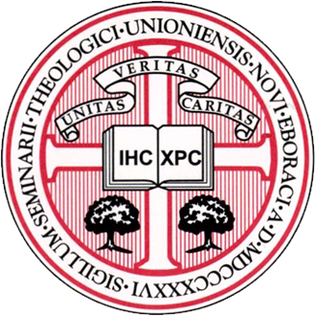
Union Theological Seminary in the City of New York (UTS) is a non-denominational Christian seminary in Morningside Heights, Manhattan, New York City. It is affiliated with neighboring Columbia University. Since 1928, the seminary has served as Columbia's constituent faculty of theology. In 1964, UTS also established an affiliation with the neighboring Jewish Theological Seminary of America.

Princeton Theological Seminary (PTSem), officially The Theological Seminary of the Presbyterian Church, is a private school of theology in Princeton, New Jersey. Founded in 1812 under the auspices of Archibald Alexander, the General Assembly of the Presbyterian Church (USA), and the College of New Jersey, it is the second-oldest seminary in the United States. It is also the largest of ten seminaries associated with the Presbyterian Church.

William Henry Green, was an American scholar of the Hebrew language. He was born in Groveville, near Bordentown, New Jersey.

Columbia Theological Seminary is a Presbyterian seminary in Decatur, Georgia. It is one of ten theological institutions affiliated with the Presbyterian Church (USA).
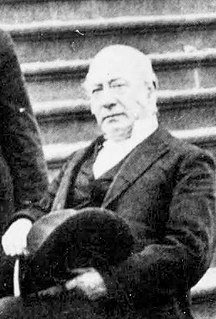
John Miley was an American Methodist Episcopal minister and theologian, who was one of the major Methodist theological voices of the 19th century.

Robert Dick Wilson, PhD, DD was an American linguist and Presbyterian Old Testament scholar who devoted his life to prove the reliability of the Hebrew Bible. In his quest to determine the accuracy of the original manuscripts, Wilson learned 45 languages, including Hebrew, Aramaic, and Greek, as well as all the languages into which the Scriptures had been translated up to 600 AD.
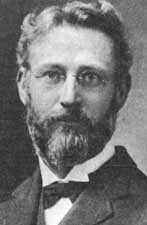
Geerhardus Johannes Vos was a Dutch-American Calvinist theologian and one of the most distinguished representatives of the Princeton Theology. He is sometimes called the father of Reformed Biblical Theology.
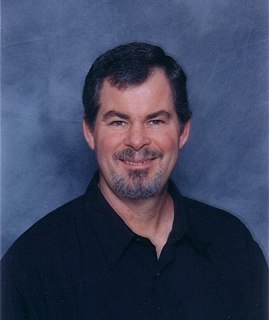
Daniel Baird Wallace is an American professor of New Testament Studies at Dallas Theological Seminary. He is also the founder and executive director of the Center for the Study of New Testament Manuscripts, the purpose of which is digitizing all known Greek manuscripts of the New Testament via digital photographs.

The Fundamentalist–Modernist controversy is a major schism that originated in the 1920s and '30s within the Presbyterian Church in the United States of America. At issue were foundational disputes about the role of Christianity, the authority of Scripture, the death, Resurrection, and atoning sacrifice of Jesus. Two broad factions within Protestantism emerged: Fundamentalists, who insisted upon the timeless validity of each doctrine of Christian orthodoxy, and Modernists, who advocated a conscious adaptation of religion in response to the new scientific discoveries and the moral pressures of the age. At first, the schism was limited to Reformed Protestantism (Calvinism) and centered about the Princeton Theological Seminary which has split into Westminster Theological Seminary, but it soon spread, affecting nearly every Protestant denomination in the United States. Denominations that were not initially affected, such as the Lutheran Church, eventually were embroiled in the controversy, leading to a schism in the Lutheran Church.
Robert Laird Harris was a Presbyterian minister, church leader, and Old Testament scholar.
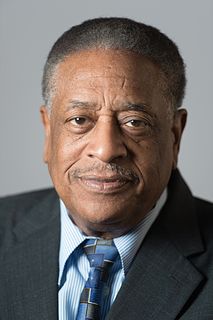
Cain Hope Felder was an American biblical scholar, serving as professor of New Testament language and literature and editor of The Journal of Religious Thought at the Howard University School of Divinity. He also served as chair of the Doctor of Philosophy program and immediate past chair of the Doctor of Ministry program. He had been on Howard's faculty from 1981 until his retirement in 2016.
Brian K. Blount is a Presbyterian minister, New Testament scholar and current President of Union Presbyterian Seminary. He is a preacher and scholar on the Book of Revelation.
Donald Harold Madvig is a retired American minister, biblical scholar and professor.
West Presbyterian Church was a congregation and two houses of worship in Manhattan, New York City. The congregation was founded in 1829 and merged in 1911 with Park Presbyterian Church to form West-Park Presbyterian Church. The first house of worship, also known as the Carmine Street Presbyterian Church, in Greenwich Village, was used from 1832 to 1865, and the second, on West 42nd Street between Fifth Avenue and Sixth Avenue, from 1865 until 1911, when it was sold and demolished. Proceeds from the sale were used, in accordance with the merger agreement, to build and endow a church for an underserved neighborhood, Washington Heights: Fort Washington Presbyterian Church. In addition, the West Church congregation had earlier established two mission churches which eventually merged to become Good Shepherd-Faith Presbyterian Church. West-Park, Fort Washington, and Good Shepherd-Faith are all active today.
William P. Brown is an ordained minister in the Presbyterian Church USA, author, biblical theologian, and the William Marcellus McPheeters Professor of Old Testament at Columbia Theological Seminary.
Elizabeth Rice Achtemeier was an American ordained Presbyterian minister, Bible professor, and author.
References
- ↑ Bulletin: Volume 6, Issue 2 Union Theological Seminary (New York, N.Y.) - 1923 "Marvin Richardson Vincent was born in Poughkeepsie, New York, September 11, 1834, and died in Forest Hills, Long Island, N. Y., August 18, 1922, in his ..."
- ↑ Addams Stratton McAllister The descendants of John Thomson, pioneer Scotch covenanter 1917 "Marvin Richardson Vincent was a professor at the Union Theological Seminary (Presbyterian), New York City. Issue (1) Sarah Elizabeth, (2) Edith Vincent.
- ↑ The library of Union Theological Seminary in the city of New York Thomas P. Slavens - 1965 "Marvin Richardson Vincent was selected to fill this position. 7 He had graduated from Columbia in 1851* and had taught in the Columbia Grammar School and the Troy Methodist University before becoming Acting Pastor of the Pacific Street ..."
- ↑ "A history of the textual criticism of the New Testament". New York, Macmillan. 1899.